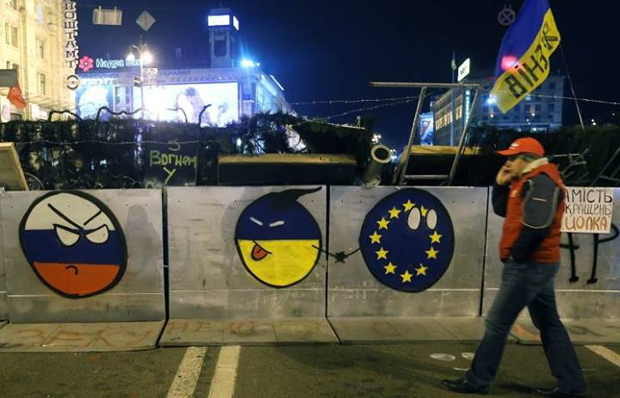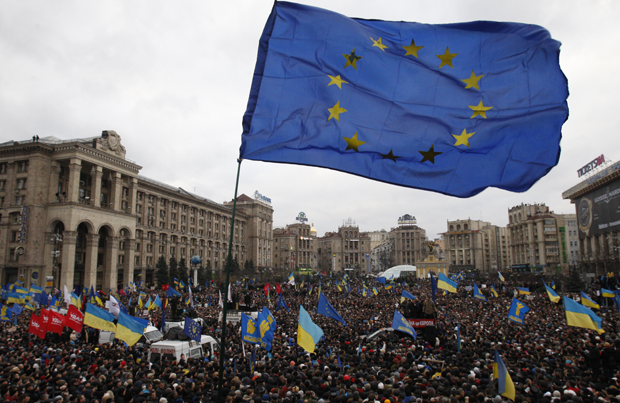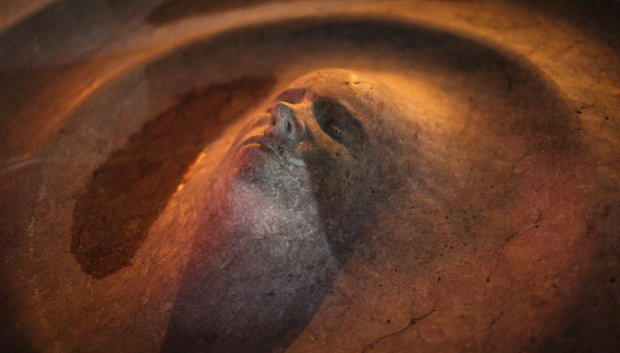7 Mar 2014 | News and features, Religion and Culture, Ukraine, Young Writers / Artists Programme
As the Euromaidan protests gripped Ukraine, French street-artist Roti travelled to Kiev. He was eager to support protesters who were struggling with a violent police response to their government’s tilt toward Russia.
For months Roti had worked on an idea for a sculpture: A woman emerging out of water. The concept, which was originally meant for Paris, took on new meaning as the demonstrators in Kiev became set on revolution.
Roti cast his idea in marble and the sculpture, New Ukraine, became an allegory for Euromaidan protesters. The woman’s face, toes and hands protruded from the block of stone. As she struggled for freedom, she created ripples in the stone surrounding her – after all, discontent spreads.
On January 7, 2014, the artist illegally installed his work at the center of Kiev’s Independence Square. “It’s a gift. Not to a nation but to its people”, Roti declared. His intentions were clear. The work came as attacks on journalists and protesters became more and more regular. New Ukraine was a symbol of hope and progress at a time when resolve could have easily wavered.
The night of the installation, protesters celebrated by dancing and singing in the street. Confidence seemed momentarily rejuvenated. In the following weeks clashes between police and protesters would claim their first lives.
New Ukraine is not the only street-art to offer support to the Ukrainian people. Graffiti decorates Kiev’s main square – crossed out swastikas and the slogan “BIG BROTHER IS WATCHING YOU” have become common features.
During protest, street-art becomes a barometer of social consciousness. Scrawled words and images on city walls reflect changing attitudes and a disdain for the ruling authority. The stencils of President Yanukovych’s body, punctured with bullet holes, were a more extreme example.
Like the ripples of New Ukraine, street art spread ideas through Kiev and further afield. With Twitter and Reddit offering a more collective version of the news, artists’ efforts escaped the borders of Ukraine and communicated their message to the global community. They achieved impact through imagery and reached a more diverse audience than most newspapers.
It was on Reddit that I discovered a photograph of a police barricade. It had been painted with a cartoon depicting a Ukrainian flag holding hands with a European flag as Russia looks on, scowling. The message was simple but memorable.

Protest posters also played an important role in boosting morale. Displayed around Kiev during the early days of the crisis, they highlighted the government’s inconsistencies and the power of the Ukrainian people. Of course, the country’s flag’s blue and yellow is the overriding color theme. Pairing graphic design with emotionally engaging political statements – “I am a drop in the ocean” – these works were incredibly empowering.
With a selection of these posters currently on display in Edmonton, Canada, it’s easy to see how imagery has the power to spread a political message. The exhibition features 50 designs which were posted around Ukraine. Each work was designed to encourage their audience to identify emotionally while keeping the message clear.
Artists use symbolism to monumentalise protesters’ efforts. With museums and galleries filled with artist’s renditions of historical events, we are programmed to link iconic moments with art. As creativity littered Kiev’s Independence Square, demonstrators were spurred on – the art around them transformed Euromaidan into a very stirring moment. Demonstrators were reminded: Here is the chance to make history.
Although they have since been annulled, anti-protest laws and restrictions on social media revealed the extent of how close Ukrainians came to losing the right to express themselves.
But on the streets, ideas would have continued to appear on walls and barricades. Street-artists cannot be tracked by algorithms. During times of crisis, they will always be on hand to support the people and spread their message.
This article was published on March 7, 2014 at indexoncensorship.org
23 Jan 2014 | Europe and Central Asia, News and features, Ukraine
This video from YouTube shows a protester abused by police in Kiev.
As the conflict in Kiev continues to unfold, Ukrainian civil society activists tell Index negotiations and urgent reaction of the international community are vital to resolve the crisis.
Severe clashes between the riot police and protesters have led to at least three deaths; two of the protesters were shot with firearms on Wednesday. One more activist was found dead after unidentified people kidnapped and tortured him. Hundreds of protesters were injured as the police used flash grenades and other weapon (along with firearms, as it appeared) against the Euromaidan demonstrators.
The Institute of Mass Information reports at least 42 journalists were injured by the actions of the police.
Index joined 25 other organisations, united in the Civic Solidarity Platform, a coalition of human rights groups from Europe, Asia and North America, in a call for an immediate end to violence and dialogue between the opposing sides, to reach a peaceful resolution to an “acute human dimension crisis in Ukraine.”
“Developments in the situation in Ukraine are critical for the whole post-Soviet history and for the issue of human rights in the OSCE countries. This is why stabilisation of the situation in Ukraine – not in an authoritarian, but in a democratic sense – is crucial for the whole OSCE region,” the joint statement reads.
The protest in Ukraine started last November as it became clear the authorities refused to sign an Association Agreement with the EU.
“Now the protests are not about the European integration. It is all about the right to live in a free country, the right to speak out, to unite and defend our freedoms,” says Maryna Tsapok, an expert from the UMDPL Association, an NGO that monitors the activities of law enforcement.
She refers to a new law adopted in Ukraine on 16 January 2014 that seriously restricts freedoms of expression, assembly and association in the country.
“The authorities say this law and the actions of the police are aimed at restoring of the rule of law. But you cannot restore the rule of law by breaking the Constitution and international treaties. The escalation of the conflict should be stopped immediately by negotiations. But while the government is talking with the opposition, the police continue to use severe force against people in the streets, and the death toll is counting.”
“The authorities of the country have crossed the line,” says Olexandra Matviychuk, the Chair of the Centre for Civic Liberties. “It is almost impossible to predict the development of the situation. But what’s clear is that real and immediate measures from the international community are needed.”
“Serious escalation of the situation in Ukraine is the direct effect of the fact that from the very beginning of the protest movement the government has not taken any single step to build a comprise, but instead made a whole range of steps to suppress the protestors. They include attempts to forcefully disperse peaceful protestors and then to persecute them, violence against journalists, threatening of activists in the regions and, finally, adoption of the draconian legislation curtailing human rights and freedoms in the country,” says Antonina Cherevko, a media lawyer.
She adds: “The Ukrainian issue today can potentially create security problems not only for the country itself, but for the whole region. In this situation, a strong reaction and action from the established democracies is highly needed.”
This article was published on 23 January 2014 at indexoncensorship.org
16 Jan 2014 | Europe and Central Asia, News and features, Ukraine

(Photo: Anatolii Stepanov / Demotix)
The Ukrainian parliament has adopted a new repressive law that seriously restricts freedom of expression and assembly, in a move the country’s civil society calls “a constitutional coup d’état”.
Law No. 3879, which enters into force tomorrow, criminalises libel (with a maximum sentence of two years of limited freedom), introduces criminal liability for “distribution of extremist materials”, allows blocking of websites and creates a Russian-style “foreign agent” definition for NGOs that use foreign funding.
Criminal liability for defamation and dissemination of extremist materials includes content posted online. The National Commission of State Regulation of Communication and Informatisation has the right to restrict access to websites “that are considered by experts to contain information that breaks the law.” Internet service providers will be obliged to buy special equipment to allow security services to monitor the internet and to restrict the access “to websites of information agencies that have no state registration.”
The law also requires mobile operators to identify SIM-cards owners; to buy a mobile contract one will have to present a passport and sign a formal contract.
The freedom of peaceful assembly is also threatened. In particular, the law forbids taking part in protests while wearing a helmet or a mask. Participating in a motorcade of five or more cars will lead to a fine and confiscation of the cars.
As the opposition tried to block the adoption of the draft law, the pro-government majority voted for the new legislative act with a simple show of hands, and without any discussion. The urgency of the law was explained by “a significant aggravation of [the] political and social crisis” in Ukraine.
“The law has been adopted by breaking all procedure rules. In fact it is a constitutional coup d’état that restricts fundamental freedoms and rights in Ukraine,” Olexandra Matviychuk, the chairperson of the Centre for Civil Liberties, told Index.
The restrictions outlined by the new law are aimed at civil society activists involved in the peaceful protests that started in Ukraine in November 2013 after the government refused to sign an association agreement with the EU.
This article was posted on 16 Jan 2014 at indexoncensorship.org



